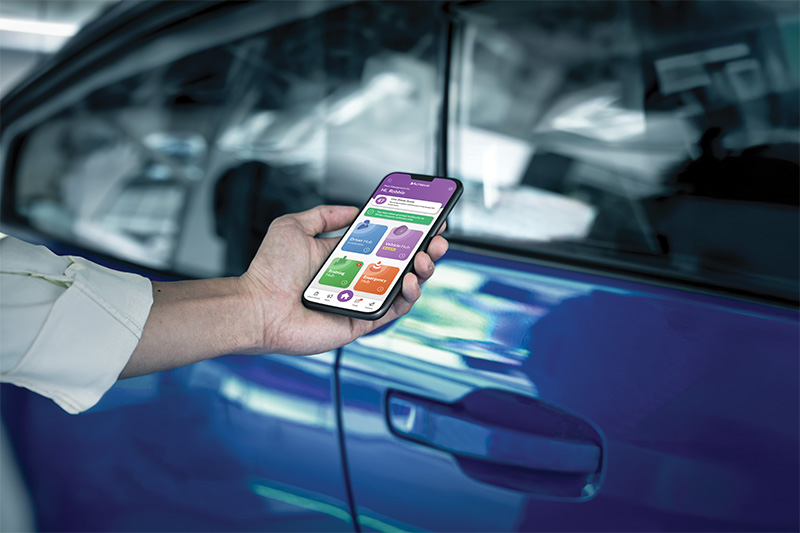Neurodiversity Celebration Week, celebrated annually, is a time to recognise and appreciate the vast spectrum of neurological differences that make us all who we are.
We are a diverse population in so many ways and the term neurodiversity simply means: “Individual differences in brain functioning regarded as normal variations within the human population.”* Often used incorrectly, neurodiversity applies to all of us.
From ADHD to autism, dyslexia, and more, neurodivergent individuals experience the world in unique ways. This celebration highlights the importance of embracing these differences, fostering inclusion, and reducing stigma. Much of the conversation around neurodiversity takes place in educational and workplace settings. However, it’s also important to consider how neurodiversity impacts daily life, including something as ubiquitous as driving.
The Neurodiverse Driver: A Unique Experience
Driving is an activity that demands focus, coordination, and an ability to navigate complex social interactions. For neurodivergent individuals, these tasks can present unique challenges. Autistic people, those with ADHD, or dyslexia can influence how a person perceives and reacts to road situations. These differences can manifest in various ways.
For example, individuals with ADHD may have difficulty maintaining attention over long periods, which could result in distractions while driving. They might be more prone to making impulsive decisions or forgetting to check blind spots, increasing the likelihood of accidents. Similarly, Autistic people may find the unpredictable nature of road traffic stressful, leading to heightened anxiety. (Did you know that anxious and depressed individuals too are considered neurodivergent?) Autistic people may also struggle with interpreting non-verbal social cues from other drivers, such as gestures or facial expressions. This can lead to misunderstandings or discomfort.
On the other hand, neurodivergent drivers can also possess strengths. For instance, autistic people may have exceptional attention to detail or an ability to follow rules rigorously, which can make them meticulous drivers. The key lies in recognising that every driver’s experience is shaped by a combination of factors. Neurological, environmental, and personal—and that one size does not fit all.
Road Rage and Its Connection to Neurodiversity
One of the most visible manifestations of stress on the road is road rage. It’s a behaviour that can be triggered by various factors, including traffic, delays, or perceived slights from other drivers. It can happen to all of us in varying degrees. However, for certain types of neurodivergent people, road rage may be amplified by heightened sensitivity to stress or frustration. For instance, those with ADHD or autism might have a lower threshold for frustration. The sensory overload of honking horns, flashing lights, and chaotic traffic could escalate their emotional responses more quickly.
Understanding all these underlying factors and how they affect us all differently is crucial in addressing road rage, not just as a behaviour but as a symptom of a larger issue related to how individuals navigate and experience the world.
The Implications for Road Safety and Inclusion
The need to understand neurodiversity in the context of driving goes beyond simply acknowledging differences. It has direct implications for road safety, driver behaviour, and public policies.
One area where this understanding can make a significant impact is in driver education, testing and training. Currently, most driving exams and training programs assume a uniform level of ability and understanding from all drivers. However, this overlooks the fact that many neurodivergent individuals may require additional support or accommodations to succeed behind the wheel. A more inclusive approach could involve designing driver education programs that take in to account different learning styles and cognitive abilities, providing tailored strategies for neurodivergent drivers to thrive safely.
Andy Neale – Wellbeing Expert:
“The Fleet Service GB Driver Management programme covers in some depth, via dedicated E Learner modules, in-vehicle driver training and its engaging Wellbeing Workshops, the key physiological elements of human performance. The key pillars of wellbeing are managing Stress, Fatigue, Hydration and Nutrition; each of these physiologically affect how we feel, how we act and how we make decisions.
The 3 ‘mental’ skills that are at the core of safe and effective driving are Concentration, Observations and Anticipation and again these are only able to be performed well if we as drivers are in a good physiological place. Perhaps ‘Driver Training’ as a coverall title is not the right one and perhaps, we should be calling it ‘Human Performance Training!’ Our Driver Management programme whilst predominantly aimed at drivers is less about ‘management’ and more about ‘training,’ providing drivers with the skills and knowledge they require to be ‘able’ to be perform, physiologically and physically.”
You can hear more from Andy in our latest podcast
Creating an environment where neurodivergent drivers are understood rather than stigmatised can help reduce the incidence of road rage and misunderstandings on the road. For instance, public awareness campaigns that address how neurodivergence can influence driving behaviour would foster empathy and patience among all road users, leading to safer and more respectful driving experiences.
Conclusion
Neurodiversity Celebration Week provides an opportunity to reflect on how neurological differences shape not just the workplace or classroom, but also our daily lives. When it comes to driving, understanding neurodiversity can lead to better road safety, a reduction in road rage, and a more inclusive driving culture. By embracing diversity in all its forms, we create a society where all individuals, regardless of their heritage, sex, age or neurological makeup, can participate and thrive—both on and off the road.
*Oxford English Dictionary
Huge congratulations to our very own Teodora Byrne who has been nominated for the Positive role model award for Disability at the National Diversity Awards 2025.
We are very proud of her at FSGB!








